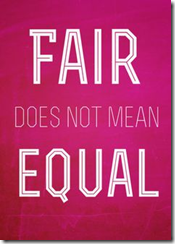Unacceptable platitude #7: “Fair does not mean equal.”
/“Fair does not mean equal” is a convenient phrase that is overly used in situations in which inequality exists and the ability to mitigate that inequality either doesn’t exist for structural or financial reasons or is beyond the intellectual and creative abilities of the people in charge to eliminate altogether.
In other words, yes, “fair does not mean equal” is sometimes applicable.
More often, however, “fair does not mean equal” its supervisory nonsense spouted by a manager, teacher, or parent who is incapable or unwilling to reach an equitable solution for their subordinates. It’s a phrase that is often friendly to the budget and the people in charge and detrimental and demeaning to the people for whom it is being applied.
Fair should mean equal whenever possible.
Fair should almost always mean equal.
Fair meaning equal should be the goal.
Don’t ever allow this management-friendly phrase to stand as truth.




